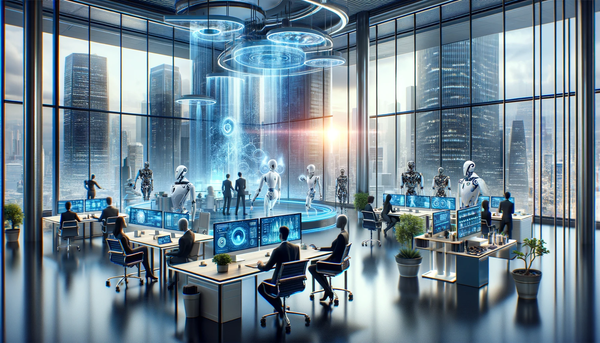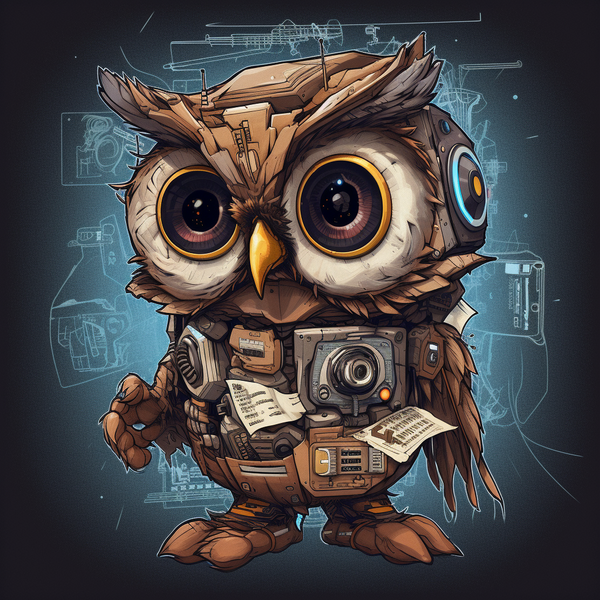When leaders and strategists discuss implementing AI into their organizations or personal workflows, I often hear the concern, "We aren't tech-savvy." But successfully implementing AI isn't just about technical proficiency. I've found that some of the most critical success factors lie in the non-technical, human elements of business.
In this article, I'll share essential themes to explore as you craft your personal and business AI strategy, so you can embrace the disruptive potential of AI without compromising your humanity and integrity.
1. Mindsets and Adaptation
One of the first teams I worked with this year was a marketing team led by an entrepreneur who told them back in December, "Create a ChatGPT account and make something."
Unfortunately, this didn't activate the same sense of urgency and limitless possibility that the entrepreneur felt. The team members saw ChatGPT as just one more thing they needed to learn, on top of everything else they already had going on. So ChatGPT went to the bottom of the priority list.
When I came in several weeks later, I helped them understand the transition from doing to being. Now that AI can help us do so much of the background work in our jobs, we can focus on being our most unique, creative selves. We can double down on our unique skills and gifts, whether it's building strong relationships or imagining brand-new ways to do things.
We cleared their team's to-do lists, redesigned new workflows that maximized their unique skill sets and the business needs, and they're off and running.
➡️ What tasks are you procrastinating on that ChatGPT can draft, prepare, or prototype in the background? How can you carve out 5 to 30 minutes right now to choose one thing to accelerate?
AI is here to stay, and it's important to cultivate a mindset of adaptability and openness to change. This means embracing a growth mindset and the willingness to learn, unlearn, and relearn in real time. Recognizing that AI can be a powerful partner rather than a threat will help you and your colleagues approach new technologies with curiosity and confidence.
This is easier said than done, which brings me to the next point.
2. Psychological Impact
When ChatGPT became publicly available, I spent 3 months heads-down auditing my own creative workflows to personally experience the learning curve in learning to partner with AI so that it creates a better result than me working on the task manually.
In the process, I lost a few weeks because I noticed that ChatGPT reignited some of my old toxic productivity patterns that I'd been working to heal: namely, overextending myself in the name of "I'll just start one more thing and then end my day." This is my classic recipe for burnout, and the opposite result of what I hoped to achieve by partnering with AI.
What I realized was that I've never had the ability to build on my ideas at the speed of creativity. Time constraints usually force me to prioritize in some way -- and AI removes those time constraints.
In the early weeks of using ChatGPT, I opened dozens more loops than I could close in a day, or a week. I developed multiple ebooks and full-length books that needed a human edit. Generated dozens of longer articles that needed a fact check and an edit. The list still gets longer every week.
Once I realized what was happening, and why I was feeling so exhausted without completing anything, I had to get tactical about boundaries to ease the nervous system overwhelm.
And that’s me, diving in with full self-awareness of my own limitations and the shadow side of the infinite possibilities AI offers.
We are learning a new way of working and a new way of thinking about work.
As AI becomes more integrated into our work and personal lives, it's vital to consider the psychological effects this technology can have on our well-being. You can strike a balance between leveraging AI's benefits and preserving mental health, self-esteem, and emotional well-being. It requires a strategic, highly personalized approach to mitigate the risks.
This applies to your clients, team, and community, too. I've noticed that as I teach people about AI tools, there's also a lot of education about the algorithms that already run silently across so much of what we do and experience online.
As you get immersed, it's even more critical to be mindful of the impact of social media algorithms and other AI-powered tools on your emotions and behaviors.
3. Ethics and Values
An entrepreneur in my network recently shared in a group chat that they were able to fire half their overseas creative team due to text-to-image AI generators. Ironically, this entrepreneur leads a personal development education platform.
I wish I'd caught them in time. I would have advised them to retrain their existing team and incentivize them to use these tools to experiment faster, and test human-made creatives against AI-generated creatives. The case study from this experiment alone could have resulted in a new business unit or revenue-generating offering with a much higher return than the cash saved from layoffs. And the business would have stayed in integrity to its core values and public mission.
When incorporating AI into your business, it's essential to consider your personal values and the ethical principles your brand stands behind. This is how I help leaders cultivate a future-proof strategy that doesn't alienate their human relationships with team, clients, and community.
Ethical, values-based leadership means learning how to partner with AI without outsourcing your humanity. It also means ensuring that AI is used responsibly to reflect your company's values and commitment to the greater good.
4. Decision-Making
One of the most significant opportunities AI presents is the ability to enhance our decision-making processes. For example, I'm personally excited about specialty AIs that have consumed every possible medical study and can provide medical personnel with up-to-the-minute insights they would never have had the time to digest otherwise.
Yet too often, I'm seeing people brag about following instructions based on "what ChatGPT told them to do." This is dangerous, because large language models like ChatGPT aren't designed for knowledge retrieval -- they're designed to predict the best next word in a sentence based on a prompt and the previous words in that sentence. This also outsources the human intelligence we bring to the party.
By combining human intuition and judgment with AI-generated insights, we can make well-informed, effective decisions that align with our goals and values. Don't delegate your differentiators as a human! Instead, harness AI as a tool to support and elevate your unique strengths.
5. Collaboration and Partnership
In my premium newsletter Creative Intelligence, I share the latest research on the impact of ChatGPT and AI in the workplace. For example, a March working paper from MIT indicates that working in partnership with AI increases productivity by 50% or more.
AI has the potential to enhance human capabilities by working alongside us, rather than replacing us. By fostering a spirit of collaboration and partnership with AI, we can find ways to leverage the unique strengths of both humans and AI.
6. Critical Thinking and Discernment
In the age of AI, it's more important than ever to develop and maintain critical thinking skills. The Creative Intelligence briefing I published yesterday goes into deepfakes, "vishing" (voice phishing), and how bad actors can use AI in a way that manipulates and scams people.
Critical thinking includes the ability to accurately assess information, fact-check AI-generated content, and navigate the AI landscape safely. Sadly, many of us are out of practice with this important skill.
Don't delegate your discernment to AI. Instead, cultivate your personal judgment to ensure you're making informed choices.
7. Digital Safety and Privacy
As we embrace AI, we must also be aware of the potential risks associated with deepfakes, misinformation, and data privacy. Educate yourself and your team about these risks and take the necessary precautions to protect your business and personal information.
A common conversation topic I have with teams is what information to put into ChatGPT (and similar large language models), and what information to always keep out of a large data corpus. It's a larger conversation that requires policy documentation and training so that employees don't accidentally put proprietary information or IP into publicly accessible databases.
And if you think this doesn't apply to your business, think again: Fishbowl research found that 70% of professionals who use ChatGPT at work don't disclose this to their boss.
The organizations I'm advising are tackling this upfront, with honesty and openness, and as a result they're becoming thought leaders in their industry at a time where we don't have established best practices.
8. Skill Development and Continuous Learning
The rapid pace of AI advancements requires us to stay on our toes and continually develop our skills.
Embrace a culture of continuous learning and invest in professional development opportunities to ensure you remain relevant and effective in an AI-driven world.
This is where my premium newsletter Creative Intelligence supports busy leaders and professionals.
My weekly briefings contain distilled, actionable insights about how to responsibly use AI to save time, launch ideas faster, and develop more well-rounded strategies and product offerings. And in our community meetups, we have deeper conversations around the nuance and wider implications of AI.
9. Work-Life Alignment
Since 2011, I've focused on helping people optimize their work-life balance to minimize burnout and create a sustainable productivity rhythm that supports their goals, dreams, and ambitions.
My lived experience demonstrates that AI can help us optimize work processes, save time, and achieve better work-life alignment. I believe that by using AI responsibly and ethically, we can create a more balanced and fulfilling work experience for ourselves and our colleagues.
10. Empathy and Human Connection
The burnout epidemic we've been experiencing the last few years proves that humans make terrible robots. We get demotivated. We need rest. We get sick, injured, or need to step away to take care of family.
In a world increasingly driven by technology, it's crucial to double down on that which makes us uniquely human.
That means we must prioritize empathy, emotional intelligence, creativity, ingenuity, and human connection -- in our personal lives and in our businesses.
Ensure that your AI implementation doesn't compromise the human touch that is essential for building trust, fostering collaboration, and nurturing meaningful relationships with customers, clients, and team members.
I audit all people-facing operations when working with businesses to make sure that AI is never deployed in a way that abuses trust or makes people feel like they're "not important enough to get face time."
Your Guide to the Human Side of AI
Of course, there's a significant technical aspect to incorporating AI. But we cannot forget the human element, especially in these early stages when people are unfamiliar with what AI can and can't do well.
In many ways, learning to partner with AI is a practical, tactical example of adapting to technological change.
For years, I coached entrepreneurs and team leaders on productivity. They wanted to work with me to get my recommendations for apps and to hear my productivity tech stack.
But the biggest productivity gains came when we worked on their mindsets, routines, and practices -- addressing the underlying psychology of high performance, resilience, and self-awareness.
The same is true here. As we've been seeing over the last few months, the AI tools will continue to evolve and emerge at a dizzying rate. So focusing exclusively on tools and prompts only addresses a piece of the larger strategy.
Millions of entrepreneurs, creators, and companies will use AI and ChatGPT this year. Most of them will take ChatGPT responses at face value and ship generic, same-samey information products and content-driven initiatives.
How will your approach be different? How can you differentiate yourself from the masses? How can you use AI to play your game even better, faster, and easier?
I'd love to help you think through these bigger questions and strategize in a way that supports your goals.
When you're ready, here's how I can help:
- Individuals: If you're looking for a one-on-one session to ask all your questions about AI implications, figure out exactly how to use it in your workflow, and get some easy time-saving wins, book an advisor session with me.
- Teams: I privately advise companies in one-time workshops and ongoing advisory containers. For a Do-It-Yourself option, my premium newsletter and community Creative Intelligence delivers weekly news briefings with my insight and context on how to apply AI to save time, work more effectively, and maximize human relationships and flourishing. (Head here and subscribe by April 1 to get 20% off your membership for Q2.)
- Leaders: As an Acting Chief AI Officer, I work with leadership teams to cultivate a future-proof AI strategy that maximizes human resources and technological capabilities. Reach out and schedule a discovery call to see if we're a fit. Or subscribe to Creative Intelligence and join our meetups to connect with other leaders working through these challenges.
Whether you work with me or do it yourself, I hope these perspectives help you understand how you can bring positive influence to the field of AI, even if you're not a technical person. We all have an important role in shaping how AI is socialized in the business community. Now is not the time to sit on the sidelines.









